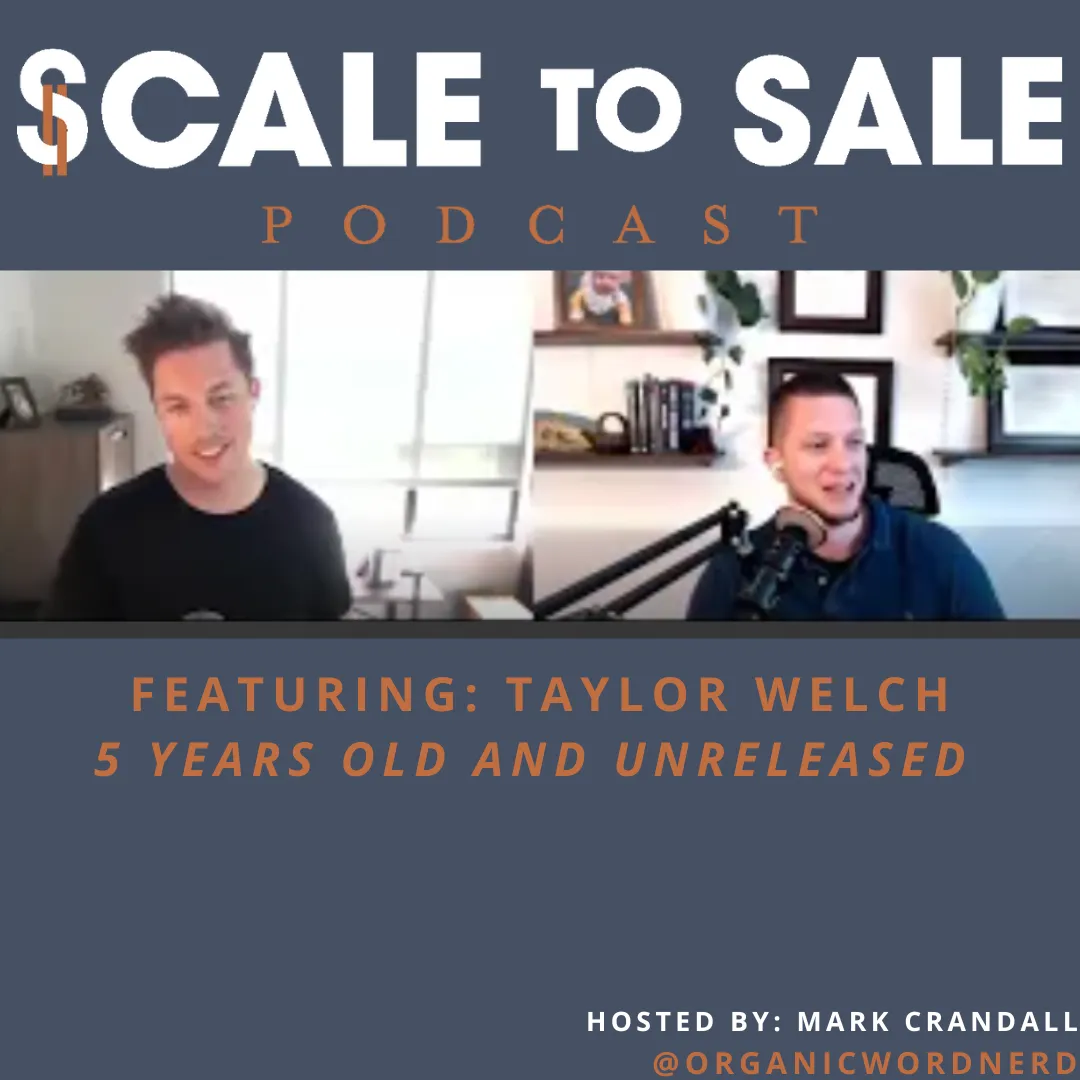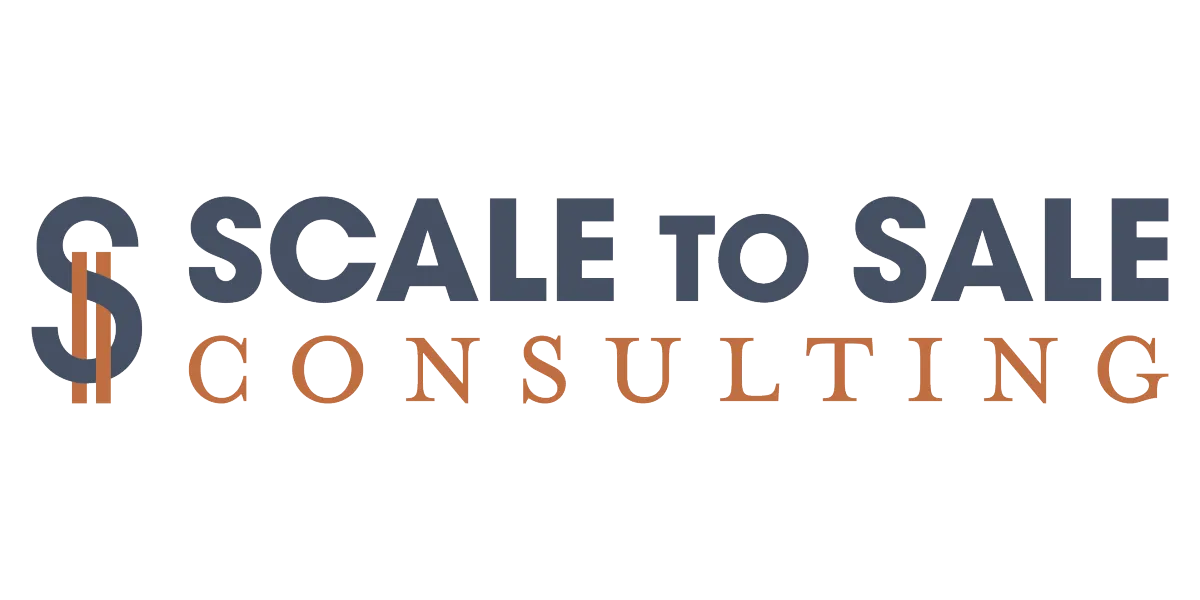From Construction Sites to Conversion Systems —
We Build Assets That Sell Themselves
The Asset Management Agency Built by Real Operators, Not Just Marketers
Who is Scale to Sale Consulting?
We’re not just another agency promising growth—we're the partner that’s actually built and exited the kinds of businesses most people only consult for.
Led by Mark Crandall, a marketing agency founder who scaled and sold multiple construction companies, we specialize in managing digital and brand assets that generate both short-term cash flow and long-term valuation.
What makes us different?
We’ve been in your shoes. We’ve grown the thing, fixed the chaos, and walked away with real wins—not just pitch decks and PowerPoints.
At Scale to Sale Consulting, we manage:
Content ecosystems that drive inbound leads organically
SEO strategies that increase visibility and valuation across the internet
Testimonial-driven marketing systems that turn happy customers into your best closers
Automation stacks that reduce overhead and boost lifetime value
Course creation and or asset expansion
Get client bookings and create backlink/collaborations created.
Whether you’re a creator building brand equity, an artist selling digital assets, or a business prepping for exit—
we know what your brand is worth... and how to make sure the market does too.
Scale to Sale Consulting Successes
Scaled 3 trades companies to $1M+ in under 18 months each
Executed 4 successful business exits, including a $5.1M sales contract
Creator of the Testimonial Waterfall system, driving organic growth through customer referrals. Get customers to sell for YOU!
Host of the Scale to Sale Podcast, sharing actionable business strategies for scaling and exiting
Signed Nef as a client
Signed Dr. Carolyn Colleen as a client
Everything you do online is an asset
Maximize your returns
Scale to Sale Consulting's Blog
Your blueprint for building digital assets that scale — and sell. Powered by real-world exits, organic marketing strategy,
and systems that turn customers into your sales force. No fluff. No paid ads. Just scalable, sellable growth.

How Taylor Welch Scaled Traffic & Funnels to $1.5M/Month | HighLevel Tips
You’ve likely seen Taylor Welch plastered across your LinkedIn feed or retargeted by a “$47 copywriting course” ad. (Trust us—your team’s already talked about it.) In a recent episode of the Scale to Sale Podcast, Taylor broke down exactly how he went from doing freelance copy to cofounding Traffic & Funnels—which now brings in about $1.5 million per month—while only working 10 hours last month. No, that’s not a typo.
In this post, we’ll pull together the biggest takeaways from our deep-dive convo—covering how Taylor:
Built Heart-Centered community at HighLevel (and why he believes it will “end ClickFunnels and Kajabi”).
Moved from being “the guy who writes all the code” to hiring, delegating, and scaling a team.
Leveraged his Theory of Constraints and “manufactured resistance” to stay sharp.
Positioned his businesses (Traffic & Funnels, Sales Mentor, WealthCap) to verticalize entire markets.
Maintains personal practices—from gratitude journaling to “daily mind medicine”—that keep him grounded.
We’ve sprinkled in actionable steps so you can start applying these concepts tomorrow. Plus, of course, we left placeholders for the YouTube and Spotify embeds—so you can drop them right into your GoHighLevel blog (dimensions: 1200 × 630 px) without rework.
The Power of Community: Why Taylor Believes “HighLevel Will End Kajabi”
Taylor Welch:
“Not because our code is better—other platforms have bells and whistles—but because our community actually cares. We have 6,000+ agency owners who lift each other up, share done-for-you templates, and police trolls when they pop up. If Kajabi or ClickFunnels tried that, they’d drown in support tickets and burnouts.”
Taylor started as a freelance copywriter in Memphis, Tennessee. By 2018, he and his cofounder Robin were building HighLevel (the white-label SaaS platform) from scratch. They quickly realized:
General Consumer Overwhelm: “Joe Schmo” would sign up, pay the monthly fee, then quit in two weeks—overwhelmed by features.
Agency-Only Focus: They pivoted to agency owners only, raising the barrier to entry. Agencies love it because they can centralize funnels, automations, SMS campaigns, calendars, and more—all under one roof with one password, one payment, one goal.
Troll-Proofing the Platform: They “locked down” the group so that if someone signs up who isn’t an agency, a trusted member (or HighLevel “cop”) flags and removes them. Then they recommend a “trusted agency” within the community (instead of ghosting them).
Taylor Welch:
“We’ve built it around giving—and that’s why we’ve 6,000+ users. If you see a HighLevel member posting a question that’s been answered a thousand times, you’ll get pinged privately, ‘Hey, check the help doc first.’ We encourage that, not just fake ‘likes.’”
Action Steps: Build Your Own Mini-Community
Audit Your Facebook/Slack Group
Look for recurring “How do I do X?” posts. Create a pinned FAQ doc or short Loom videos to answer them.
Appoint 1–2 “community champions” (experienced users who volunteer to moderate).
“Agency-Only” Model (or Equivalent)
If you’re in the coaching/freelance space, add a quick one-question quiz at signup to ensure members fit your core avatar (e.g., “How many clients do you serve monthly?”).
Referral-Based Policing
Encourage existing members to flag off-topic or disingenuous posts. Offer a “thank you” shout-out or a $25 gift card for each verified referral.
Spotify (Audio):
Evolving from “Coder” to “CEO”: Delegating Decisions, Not Just Tasks
Taylor Welch:
“I’m a software engineer by trade—all I knew was code. I thought, ‘If I write more features, everything will work.’ But then we built amazing value for agencies, showed demos, and…they ghosted us. We realized we needed a marketing-agency avatar that could handle onboarding. Once Robin got on board, he said, ‘You can’t do this for Joe Schmo. We need a done-for-you team for agencies with 30+ clients.’ That pivot saved us.”
Key Lessons on Delegation:
Level 1 Delegation = “Hands”
You assign someone a task: “Build this funnel.” They do it exactly how you said (or half-mess it up).
You’re still in the weeds, telling them every detail.
Level 2 Delegation = “Brain”
You hire someone to think for you (e.g., a CSM or onboarding specialist at HighLevel).
When a user asks a question, they figure out the answer, post it, or escalate it—without you having to weigh in.
If someone messes up, you say: “Okay, but don’t do that same mistake twice.” You don’t yank them for trying.
Taylor Welch:
“In 2018, we had 10 days where we closed exactly 1 sale in 10 days. That will set you on fire. We had burned out, micromanaging every funnel, every client call, every ticket. When we finally pulled back and let people solve problems themselves, the business grew. Suddenly, nobody was waiting on us for every little answer.”
Action Steps: Build Your “Level 2 Team”
Identify One Critical Role to Upgrade
Example: If you’re still personally handling every support ticket → hire a dedicated “Onboarding & Support Specialist” to answer first-line questions.
Provide them with a 2–page “Escalation & Swipe File” so they know when to patch in and when to send a help-doc link.
Institute “Designated Decision Meetings”
Weekly, ask each team member: “What’s one decision you solved this week without me?” Celebrate it publicly in your stand-up.
Set “Mistake Quotas” (within reason)
Give each new hire permission to make up to 3 “harmless” mistakes in 90 days—then they must present what they learned and how they fixed it. This builds autonomy.
The “Theory of Constraints” & “Manufactured Resistance”: Sharpening the Mind
Taylor Welch:
“When you see someone bench-pressing 335 lbs, that’s manufactured resistance (the plates on the bar). Your brain can do the same. Every morning, I pick a target plus a constraint that feels impossible. For example: ‘How do I double sales but cut hours in half?’ or ‘How do I buy 150 houses a year—and make them all cash-flowing?’ It forces you into creative problem-solving. Once you’ve wrestled with that impossible question on a blank page, everyday obstacles look like a warm-up.”
Breakdown of “Manufactured Resistance”:
Define Your Target (What You Want):
E.g., “Add 30 new high-ticket clients this quarter.”
Add an Opposite Constraint (What Feels Impossible):
E.g., “We cannot onboard any new person for these 30 clients—our current staff is maxed.”
Brainstorm Solutions with a Notebook (20 Minutes Minimum):
“Can we automate a modular onboarding template?”
“Can we train clients to self-serve with a “Client Crash Course” video series?”
“Can we bundle prebuilt funnel “recipes” instead of bespoke builds?”
Taylor Welch:
“You’ll be surprised: the solutions you scribble at 5 am on a blank page often outperform anything you try to patch in under pressure later that day. You pre-solve your own bottlenecks.”
Action Steps: Apply “Theory of Constraints” Tomorrow
Grab a Blank Notebook (or “Day One” app) at 6 AM
Write one sentence: “My Target: ____. My Constraint: ____.”
Spend 20 minutes brainstorming 10+ potential workarounds or solutions (no judgment).
Share Your Constraint with Your Team
At your next meeting, say: “Here’s what I’m wrestling with. What would you try?”
Even if they give you one bullet point idea, that’s often enough to spark the right fix.
Set a Weekly “Mirror Session”
Every Friday, review your notebook entries. Circle the ideas you actually implemented.
Celebrate progress (& shame the unimplemented ones)—then set a new target/constraint for next week.
Watch on YouTube
Taking Over Entire Markets: Traffic & Funnels, Sales Mentor, WealthCap
Taylor now co‐leads three distinct—but interconnected—verticals:
Traffic & Funnels (5 years old; ~$1.5M/month)
Core product: Marketing “playbooks,” funnel templates, paid ads strategy, client acquisition tactics.
Price points: $2K–$5K for courses/ticketed events.
Sales Mentor (2 years old; trending ~$850K/month)
Onboarding sales teams, building “Sales Mentorship” pods, role-playing “cold call” scripts.
Price: $3K–$10K p/seat for live cohorts.
WealthCap (1 year old; buying 30 houses/month; ~$100K–$150K/house)
Short-term “BRRRR” (Buy-Rehab-Rent-Refinance-Repeat) model.
Focus on markets like Charlotte, Kansas City, Birmingham, Knoxville.
Taylor Welch:
“You can treat everything we do as just income streams—or you can see each as a way to verticalize the market. Who’s undercutting your margins today? Own that. Get into plumbing in your key cities. Buy a landscaping company that’s already handing out postcards. Each acquisition can either be a new revenue line or a hedge—whatever reduces your spend on ads, marketing, or operations.”
Action Steps: Start Your “Verticalization” Playbook
List All Significant Expenses in Your Business
E.g., “We spend $12K/month on outsourced landing pages.”
Ask: “Can I Build or Buy That Company Instead?”
Find a freelance landing-page shop, buy their client list (or equity), then feed them your own funnel work.
If it costs $50K to acquire them—and it saves you $144K/year in external fees—it makes sense.
Repeat for 3 Key Nodes in Your Supply Chain
If you spend a ton on:
Graphic design
Copywriting
Video editing
Hunt down a small agency or individual you can merge or co-own.
Legacy & Impact: Beyond Profits, Towards Purpose
Taylor’s definition of success has evolved:
2015–2017: Replace his 9-to-5, master marketing, scale Traffic & Funnels.
2018–2019: Survive burnouts, learn delegation, grow to $350–$450K / month.
2020–2021: Double down on philanthropy—partnering with anti-human-trafficking orgs and feeding families.
2022 & Beyond: Build “Perpetual Giving Machines.” Don’t just give money away—create endowment models (e.g., creating assets that produce cash flow to feed 70 kids every Christmas, forever).
Taylor Welch:
“It’s easy to write a $5,000 check, but what if we create a real estate fund that pays $100K/year to a charity? That money doesn’t come from my time or my hustle—it comes from an asset we built once. Eventually, my daughter won’t have to rely on me. She’ll let the fund feed people she cares about.”
Action Steps: Sketch Your 5-Year “Giving Machine”
Step 1: Identify One Cause You’re Most Passionate About
E.g., feeding underprivileged kids at Christmas, or funding local education.
Step 2: Determine a Tangible Asset to Support It
Options: Real estate, dividend-paying stocks, a mini-“online course” empire.
Step 3: Calculate the “Magic Number”
If your goal is $70K/year for charity—what size real estate portfolio (or investment) do you need?
E.g., 35 rental properties at $200/month net cash flow = $84K/year.
Step 4: Backfill Your “Theory of Constraints”
“How do I acquire 35 cash-flowing rentals in 36 months with zero net cash out of pocket?”
Brainstorm partnerships, JV deals, owner financing, or wholesale flips.
Personal Practices: “Daily Mind Medicine” & Gratitude
Taylor Welch:
“I journal every day—no prompts, just stream-of-consciousness. If I go back to 2018, I see the week we only did one sale in 10 days. That one little moment of perspective keeps me humble. Then I do “Daily Mind Medicine,” a 3–5 minute podcast I record Monday–Friday. I talk about mental models (like manufactured resistance), mindset (gratitude vs. drive), and how to frame obstacles as tuition rather than tragedy.”
Cornerstone Practices:
Daily Journaling (via Day One App)
Revisit old entries to see how far you’ve come (and feed your gratitude).
“Daily Mind Medicine” Podcast
Even if you don’t listen, recording it forces Taylor to articulate his thinking clearly—millions of people benefit.
“Mirror Sessions” (Weekly Check-Ins)
Every Friday, Taylor reviews:
Wins & losses (What worked? What failed?)
New “manufactured constraint” for next week
One thing he’s grateful for and one thing that still bugs him (to fuel drive).
Action Steps: Adopt Your Own “Mind Medicine” Routine
Step 1: Pick One Listening/Recording Time
Example: 5:45 AM, 5 minutes. Put a “Daily Mind Medicine” alarm on your phone.
Step 2: Journal Without Judgment (5–10 Minutes)
Write exactly how you feel—no editing. If it’s “I’m stressed my ads tanked,” that’s okay. Just get it out.
Step 3: Friday “Reflection & Constraint Check”
What was your weekly “manufactured resistance”? (E.g., “Grow IG followers by 500 with one reel/week.”)
Did you solve it? If not, why not? Plan a new constraint for next week.
Handling Haters and Intellectual Property Theft
Taylor Welch:
“I’ve had exactly 1,000 copycat claims:
• Someone jacks our funnel verbatim and runs it as “their own.”
• Then—ironically—someone else says THEY had that funnel first and we ripped them off. 😅
Bottom line: trolling & IP theft are just part of being big enough to matter. Your best weapon is to innovate so fast that would-be copycats can’t keep pace. Also—pity them; they’re stuck in a mindset that building value is ‘steal/sell.’ You, meanwhile, invest in assets that keep compounding.”
Action Steps: Stay 5 Steps Ahead of Trolls
Innovate Weekly
Set an internal “Innovation Hour” every Tuesday at 2 PM—no team member produces deliverables; they brainstorm new offers, new funnel sequences, or new “lead magnets” no one’s doing yet.
“Cheat–Sheet Releases”
Every time you release a core template or playbook, bundle it with 3–5 “advanced hacks” (video walkthroughs, airtable templates, client-only bonuses). Make the cost of copycatting too high.
“Pity & Ignore” Mindset
If you see a bad review or a competitor trolling:
Decide internally: “Does this genuinely threaten lives? (No.) Then ignore it.”
If it’s a blur, record a short “My five-second response” note in your CRM (so you don’t stew for years).
Getting Started with HighLevel
If you’re an agency owner who’s tired of juggling ClickFunnels, Kajabi, ActiveCampaign, Calendly, and a dozen other subscriptions, Taylor’s recommendation is clear:
“One platform, one password, one payment, one goal.”
HighLevel Demo & Signup (Affiliate Link):
Get started with HighLevel →
Our agency (Start to Finish Marketing) will handle your initial onboarding (yes, done-for-you migrations, automations, and funnel setups). We’ll train your team on “level-two delegation,” so you can stop drowning in support tickets and focus on growth.
Conclusion & Next Steps
Taylor Welch’s story is proof that you can go from “I code, therefore I am”—to “I build multi-million-dollar businesses in three industries—while working fewer hours and focusing on impact.” It all comes down to:
Community over Features (your tribe will champion you).
Delegating Decisions, Not Tasks (stop micro-managing).
Manufacturing Resistance Daily (boundary-pushing prompts sharpen your brain).
Verticalizing Expenses (own the plumbing, the lawn care, the marketing, so you never get squeezed on margins).
Keeping a “Giving Machine” Mindset (legacy means assets that serve causes beyond your lifetime).
Now it’s your turn to put these principles to work:
Grab a notebook:
Write your next “Target & Constraint” first thing tomorrow.
Audit one expense line:
Can you build/buy that function in-house to capture more margin?
Start a “Friday Mirror Session”:
Review this week’s wins (big or small) and set a fresh “manufactured constraint” for next week.
When you do, you’ll be following in Taylor’s footsteps—stepping into heart-centered hustle, real impact, and a business that can scale without you.



Facebook
LinkedIn